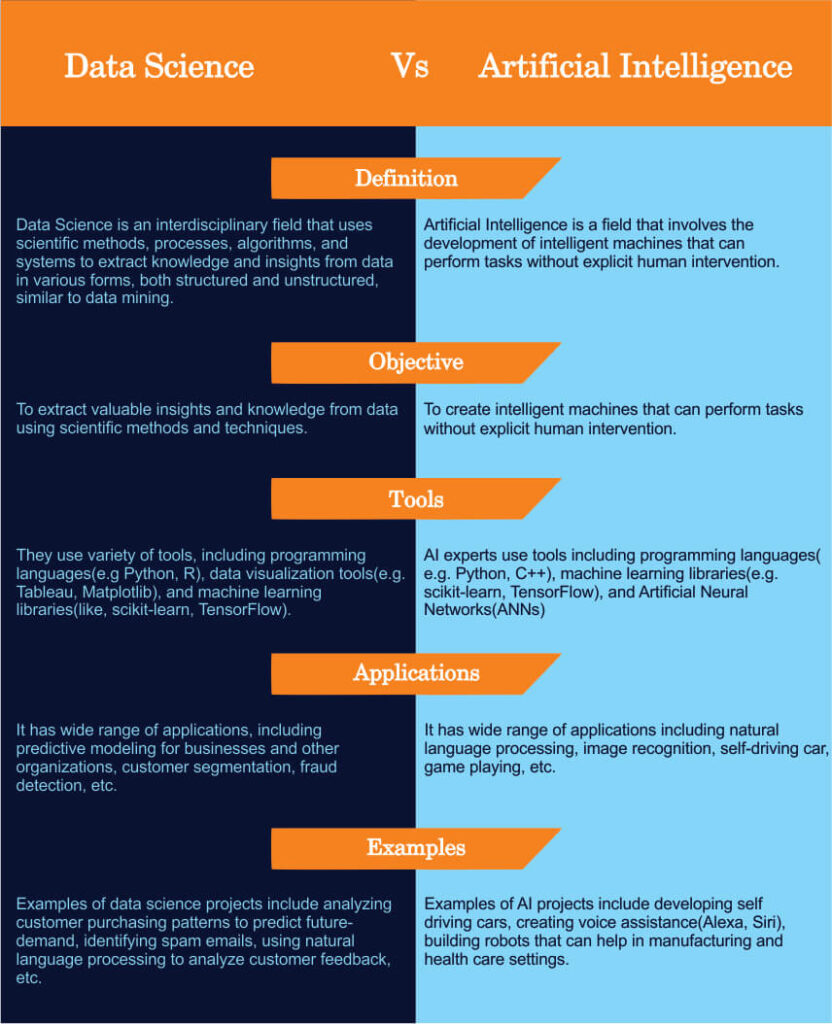Ever wondered what the differences between data science and artificial intelligence are? Is one more powerful than the other, or do they work together to create something better? In this article, I’ll be exploring the distinctions between these two disciplines, and how they can be used to create something extraordinary.
You Can Also Read: Difference Between Data Science and Data Analytics
What is Data Science?
Data science is an interdisciplinary field that uses scientific methods, processes, algorithms, and systems to extract knowledge and insights from data in various forms, both structured and unstructured. In data science, data is processed and analyzed to gain useful insights and conclusions that can be used to improve processes, products, decisions, and strategies for businesses and other entities. It encompasses a variety of techniques such as machine learning, predictive analytics, visualization, data mining, statistics, mathematics, and so on.
Moreover, data science also includes the development of platforms and tools to enable data-driven decision-making. This involves building applications, software, and databases that enable data collection, storage, analysis, and interpretation. The goal is to provide insights and recommendations that can inform better decisions. The individuals who work in this field are known as data scientists, and they combine domain knowledge with data analysis and computer science to create solutions.
What is Artificial Intelligence?
Artificial intelligence refers to the branch of computer science that deals with the development of intelligent agents, which are systems that can reason, learn, read and act independently. Artificial intelligence is one of the most popular topics in computer science and an area of active research, with applications in many different fields ranging from robotics to natural language processing.
In artificial intelligence, a number of different algorithms are used to create intelligent agents that can interact with their environment in an intelligent way. These algorithms take a variety of forms, from supervised learning algorithms that learn from labeled data to unsupervised learning algorithms that can make generalizations from data without labels. Artificial intelligence is also often used for predictive analytics, which uses past data to predict future outcomes.
Data Science Vs Artificial Intelligence(Comparison Table)
The following table shows 5 of the main comparisons between data science vs artificial intelligence.

Key Differences Between Data Science and Artificial Intelligence
- Definition: Data science is a field that uses statistical and computational techniques to extract insights and knowledge from data. On the other hand, AI is a field that focuses on the development of computer systems that can perform tasks that typically require human intelligence, such as learning, problem-solving, and decision-making.
- Purpose: The main purpose of data science is to extract insights and knowledge from data. On the other hand, the main purpose of AI is to develop intelligent systems that can perform tasks without explicit human intervention.
- Tools: Data scientists use a wide range of tools, including statistical software, programming languages, machine learning, and data visualization tools, to analyze and interpret data. AI researchers and engineers use a variety of tools, including machine learning algorithms, natural language processing techniques, and robotics frameworks, to build intelligent systems.
- Responsibilities: Data scientists are responsible for collecting, cleaning, and preparing data for analysis, as well as designing and implementing statistical and machine-learning models to extract insights and knowledge from the data. AI researchers and engineers are responsible for designing and building intelligent systems, as well as maintaining and updating these systems as needed.
- Data: Artificial intelligence looks at static data sets. In contrast, data science also incorporates real-time information.
- Scope: Artificial intelligence is mainly used for decision-making. On the other hand, Data Science can be used for both decision-making and prediction.
- Stage: Artificial intelligence is still in its early stages, while data science has been around for longer and is more mature
Overall, while data science and AI are related fields, they have different definitions, purposes, tools, responsibilities, and a few other factors. Data science focuses on extracting insights and knowledge from data, while AI focuses on building intelligent systems that can perform tasks without explicit human intervention.
Conclusion
Data science and artificial intelligence are two distinct fields that are essential in helping businesses unlock the potential of their data. Data science focuses on leveraging large amounts of data to gain insights into customer behavior, while AI takes this a step further by automating complex tasks. Understanding the differences between these two disciplines is key for organizations looking to capitalize on both areas. With data and AI each having such a wide range of applications, it is important for companies to find ways to integrate them together for maximum return.
Reference Sites:




4 Comments